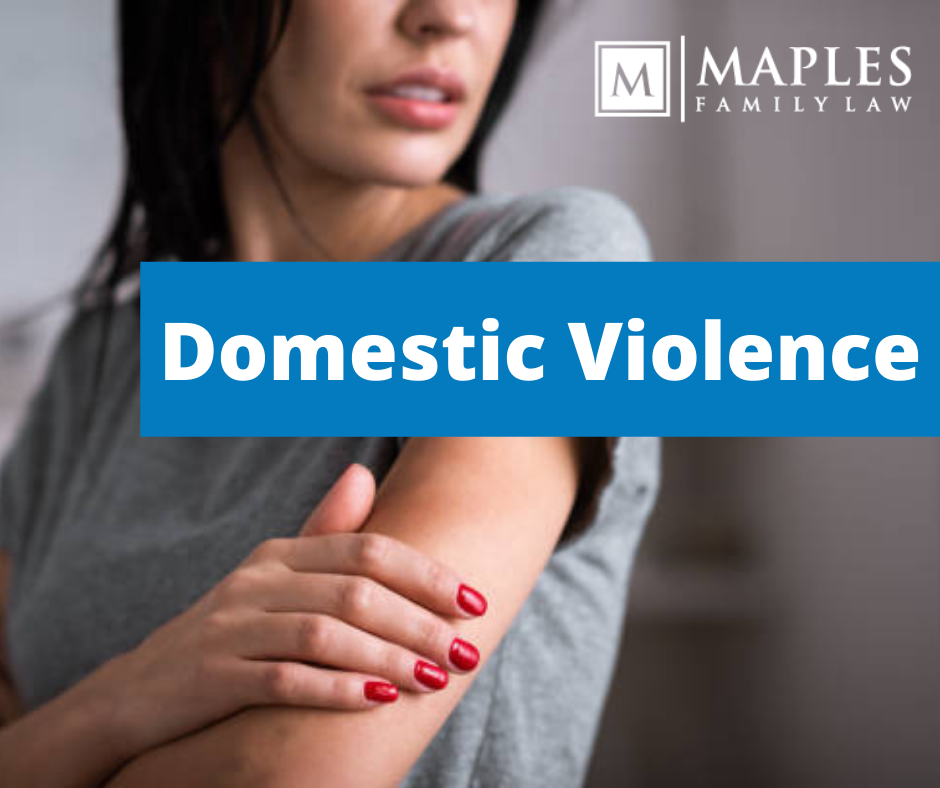 Child Custody
Child Custody
Domestic Violence: 3 Family Law Factors to Break Free…
Table of Contents

A Safe Haven During Troubled Times
Domestic violence casts a dark shadow over families, leaving a trail of pain, fear, and uncertainty. We understand that arriving at this page might mean you’re facing a difficult and frightening situation. At Maples Family Law in Stockton, we believe that no one should endure abuse, and we are committed to providing a safe haven of family law support for victims seeking justice and protection.
In California, the courts recognize the devastating impact of domestic violence and have laws in place to protect victims while holding abusers accountable. But navigating the legal system while dealing with the trauma of domestic violence and abuse can be overwhelming. That’s where we come in.
This article explores how domestic violence intersects with family law proceedings and outlines the options available for those seeking safety and a fresh start. We’ll discuss how domestic violence affects:
- Custody and Visitation: Prioritizing the safety of children
- Protective Orders: Creating a shield against further abuse
- Financial Support: Ensuring victims are not further burdened
If you or someone you know is experiencing domestic violence, please know that you are not alone. Maples Family Law is here to provide compassionate legal guidance and unwavering support as you navigate this challenging journey.
Domestic Violence, Custody, and Visitation: Putting Children First
When domestic violence enters a home, it’s not just the adults who suffer. Children caught in the crossfire are deeply affected, and their safety and well-being become paramount in any family law proceeding. California courts understand this and take a strong stance in prioritizing children’s best interests when domestic violence is present. Here’s how a history of abuse can shape custody and visitation orders:
Supervised Visitation: Shielding Children from Harm
In cases where there’s a risk that a parent might harm a child, either physically or emotionally, the court may order supervised visitation. This means that visits with the child must occur in the presence of a neutral third party, such as a social worker or a trained supervisor at a designated facility.
Why Supervised Visitation?
- This measure allows a child to maintain some form of contact with a parent while ensuring their safety.
- It also offers the court a chance to observe the parent-child interaction and assess any potential risks.
Restricting Custody: Prioritizing Safety Above All Else
When domestic violence is severe or poses a significant threat to a child, the court may limit or even terminate the abuser’s custody rights. This decision is never taken lightly and is based on evidence that demonstrates a clear danger to the child’s well-being.
What Factors Are Considered?
- The court carefully evaluates the severity of the abuse, the impact on the child, any patterns of coercive control, and the abuser’s willingness to address their behavior.
- The primary goal is to protect the child from physical or emotional harm.
Protecting the Victim: Creating a Safety Net
The court has the power to issue orders that safeguard both the victim of domestic violence and the child. These may include:
Restraining Orders:
- These orders prohibit the abuser from contacting or coming near the victim and their children.
- They can provide a crucial barrier against further abuse and harassment.
No-Contact Orders:
- These orders may be put in place to prevent any direct or indirect contact between the abuser and the child, especially in cases where the abuse was directed at the child.
The Financial Scars of Abuse: How California Law Protects Victims
Domestic violence often leaves victims grappling with more than just emotional and physical wounds. Abusers frequently use financial control as a tool of power and manipulation, leaving their partners in a precarious economic position. California law recognizes the devastating impact of this financial abuse and offers several protections:
Spousal Support: Acknowledging the Impact on Earning Capacity
When determining spousal support (also known as alimony), the court takes into account the impact domestic violence has had on a victim’s ability to earn a living. Abuse can disrupt careers, limit educational opportunities, and create long-lasting financial insecurity.
- Factors Considered: The court may consider the length of the marriage, the victim’s earning potential, the abuser’s financial resources, and the extent to which the abuse hindered the victim’s ability to become self-sufficient.
- Goal of Support: Spousal support aims to help the victim regain their footing and establish financial stability after leaving an abusive relationship.
Child Support: Ensuring Children’s Needs Are Met
Domestic violence doesn’t just affect the adults involved; it also has a profound impact on children. California courts prioritize the well-being of children in cases of abuse.
- Calculating Support: When determining child support, the court considers the financial needs of the child and the income of both parents. Domestic violence can be a factor in this calculation, as the court seeks to ensure the child’s needs are met despite the circumstances.
- Protecting the Child’s Future: The court may order the abuser to pay a higher amount of child support if their abuse has negatively impacted the victim’s ability to provide for the child.
Financial Abuse: A Hidden Form of Control
California law explicitly recognizes financial abuse as a form of domestic violence. This type of abuse involves tactics designed to control a partner’s access to resources and create economic dependency. Examples include:
- Controlling Finances: Limiting access to bank accounts, credit cards, or cash.
- Sabotaging Employment: Interfering with a partner’s job by constantly calling, making them miss work, or even getting them fired.
- Running Up Debt: Secretly using a partner’s credit cards or opening accounts in their name.
- Withholding Necessities: Refusing to provide basic needs like food, shelter, or medical care.
Finding Strength and Support in the Face of Abuse
Leaving an abusive relationship takes immense courage. It’s a journey fraught with emotional turmoil, legal complexities, and financial uncertainties. It is a journey that encompasses rebuilding your emotional health and self-esteem (mental health) and navigating the complexities of the legal system concurrently. But you don’t have to walk this path alone. At Maples Family Law, we understand the challenges you face and are here to provide compassionate guidance and unwavering support every step of the way.
Our experienced team is dedicated to protecting your rights and advocating for your safety and well-being. Whether you need help securing a restraining order, navigating child custody arrangements, or establishing financial independence from your abuser, we will be your steadfast allies in the pursuit of justice and healing.
Remember, you are not defined by the abuse you’ve endured. You are strong, resilient, and deserving of a life free from fear and violence. Let us help you reclaim your power and build a brighter future for yourself and your children.
If you are ready to take the first step towards a safer tomorrow, reach out to Maples Family Law today. We are here to listen, to support, and to empower you on your journey to healing and freedom.







